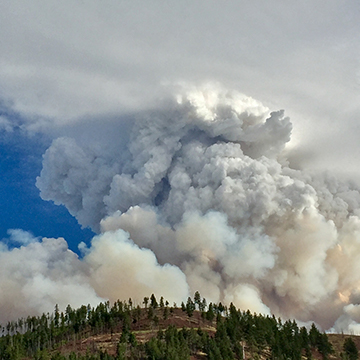Dr. Erin Landguth interviewed on wildfire smoke research, potential impacts for COVID-19

In June 2020, CPHR researchers, led by Dr. Erin Landguth, published a study in Environment International: “The delayed effect of wildfire season particulate matter on subsequent influenza season in a mountain west region of the USA.” Dr. Landguth has responded to multiple media inquiries regarding this research and potential impacts of wildfire smoke (and the upcoming wildfire season) on COVID-19.
“Based on their analysis, the researchers concluded the epic 2017 wildfire season in Big Sky Country caused influenza cases that winter to at least double and possibly rise as much as fivefold,” wrote John Upton of Climate Central for KQED. “Influenza kills tens of thousands of Americans every year, and the findings also have worrying implications for COVID-19 and other respiratory infections. Landguth is now gathering data from all Western states to expand the influenza research, and is also starting to investigate relationships between smoke waves and COVID-19 infections.”
National Geographic also interviewed Dr. Landguth about the CPHR study:
“A study published earlier this month in the journal Environment International suggested an especially active wildfire season in the summer was associated with more cases of influenza the subsequent winter. Wildfire smoke carries dangerous particles called particulate matter 2.5, or PM 2.5, which can harm a person’s lungs and immune system. Erin Landguth, one of the study’s authors and an air pollution researcher at the University of Montana, cautions that more work needs to be done to establish a clear link between inhaling wildfire smoke and a greater vulnerability to influenza and coronaviruses.
What is clear, she says, is that PM 2.5 ‘wreaks havoc on our lungs.’ "We have evidence that it suppresses immune response, and it causes inflammation in the cells of our lungs,’ Landguth says.”
When speaking with Wyoming Public Media, Dr. Landguth stated, “[Air pollution] causes inflammation and cell damage to our lungs. So all of this suggests a concern and worry for our wildfire season in our region increasing our potential risk factors for COVID-19. Really in these times we want to minimize risk where possible.”
From Montana Public Radio: “Erin Landguth at the University of Montana recently published a study showing influenza case numbers spiked three to five times during winters following intense fire seasons. ‘And so 50 out of the 51 counties, essentially, that we looked at came back positively associated with this effect,’ she said. Landguth is adapting her study to examine that same correlation with COVID-19. She said a similar effect is likely, given the strong results from her study on influenza.”
Other media interviews and mentions:
- MIMS Infectious Diseases, June 14, 2020
- Colorado Public Media, August 24, 2020
- The Denver Channel, September 3, 2020
- Climate Central Workshop, September 2, 2020
- ABC10, September 9, 2020
- The New York Times, September 11, 2020
- Inside Climate News, October 24, 2020
